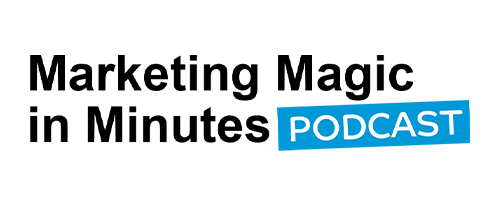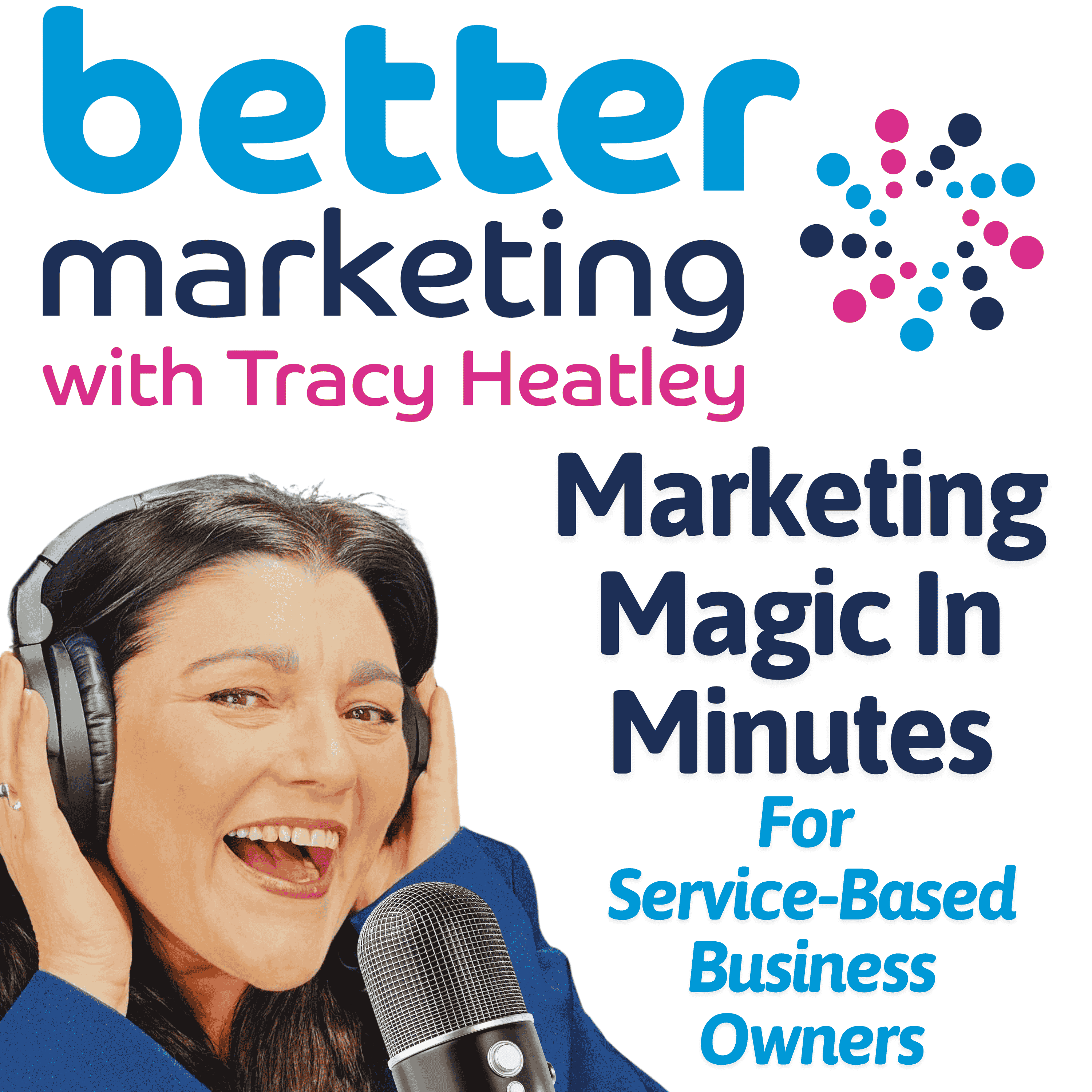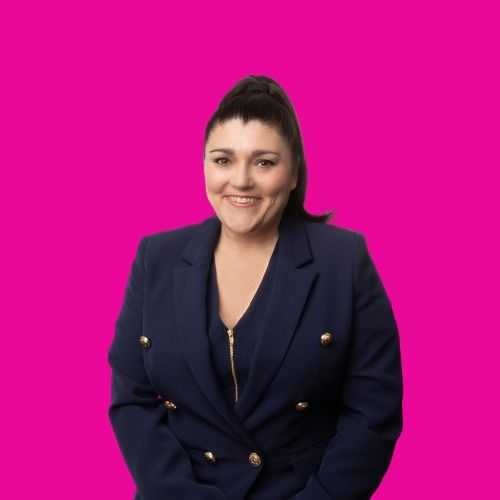Episode 3
Digital Marketing Mastery: Tools and Tactics for Success
In this episode of Better Marketing, Marketing Magic in Minutes, I explain why digital marketing isn’t just a buzzword—it’s a lifeline for small businesses looking to thrive in today’s fast-paced world. In this episode, I’m tackling the big question: How can you make digital marketing work for you without feeling overwhelmed?
It starts with understanding the basics—like why having a killer website matters and how SEO can work its magic. But we won’t stop there! I’ll also be diving into the power of social media and why genuine engagement, not just posting for the sake of it, is the key to success.
I’ll share some golden nuggets on avoiding common pitfalls, like inconsistent posting and neglecting analytics, plus a simple way to build a marketing plan that keeps your goals front and center. Whether you run your marketing solo or work with an agency, this episode will give you the confidence—and a little flair—to navigate the digital marketing maze like a pro!
Connect with me on LinkedIn and visit my website www.tracyheatley.com, where you can download my FREE GUIDE using the promo code POD2025 to win a power-hour session with me!
Remember, Better Marketing means better business!
Transcript
Hi, I'm Tracey Heatley and I really appreciate you tuning in to this episode of Better Marketing Marketing Magic in minutes.
Speaker A:Today we're talking about digital marketing Mastery, the tools and the tactics that will help you get the best results for your small business.
Speaker A:With so many options available, digital marketing can feel overwhelming sometimes.
Speaker A:But it doesn't have to be.
Speaker A:In this episode, I'll help you cut through the noise, focus on what works, and show you how to build a digital marketing strategy that importantly aligns with your business goals.
Speaker A:By the end, you'll have a clear, practical guide and steps to refine your marketing and make it work for you.
Speaker A:So let's get started with your digital marketing strategy.
Speaker A:First of all, I think it's important to cover what exactly digital marketing is.
Speaker A:Simply put, digital marketing is any marketing that happens online.
Speaker A:It includes things like websites, your online presence and content.
Speaker A:SEO, which is an abbreviation for Search Engine Optimization, which is all about getting found on Google and other search engines.
Speaker A:Social media marketing using platforms like LinkedIn, Facebook and Instagram, for example.
Speaker A:It includes email marketing, which is about nurturing your leads and staying connected with your customers.
Speaker A:Then there's ppc, which is paid advertising online, so ads for search engines and social media.
Speaker A:And then there's content marketing.
Speaker A:My favorite Blogs, videos and podcasts to attract and engage audiences.
Speaker A:Not every business needs every digital marketing channel that's available.
Speaker A:The key is to identify the right mix for your business and focus on what will give you the best return.
Speaker A:Let's look at some of the most effective digital marketing channels for small businesses.
Speaker A:Let's break it down and discuss some of the best digital marketing channels for small businesses and how you can use them effectively.
Speaker A:Number one Websites and SEO Getting found online.
Speaker A:Your website is your digital shop front.
Speaker A:It needs to be clear, it needs to be user friendly and it needs to be optimized for the search engines.
Speaker A:It's really important for small businesses.
Speaker A:SEO is about getting found.
Speaker A:It helps you appear on Google and the other search engines so that your potential customers can find you when they search for the products and services that you offer.
Speaker A:If you're not focusing on SEO, you could be missing out on loads of free traffic and leads.
Speaker A:Quick tip.
Speaker A:Make sure your website is mobile friendly and it loads quickly.
Speaker A:Most people will be using their phones.
Speaker A:If your website is slow, you could lose customers.
Speaker A:It's also important to make sure that you monitor your site traffic so you know exactly where your businesses are coming from, because not all businesses are the same.
Speaker A:So take for example, based on what I've just said a lot of people use the phones to search online, but when I look at the traffic from my website, I know that most of my users are actually coming from desktops rather than mobile.
Speaker A:So check what's happening within your business so that you can be aware of that.
Speaker A:But either way, make sure that everything's optimized and is mobile friendly.
Speaker A:Now let's look at social media and choosing the right platforms for you.
Speaker A:Social media isn't about being everywhere.
Speaker A:If someone's telling you that you need to be on every single platform all the time, three, four, five times a day, it can be too much.
Speaker A:Especially if you're a small business owner that's responsible for doing your own marketing.
Speaker A:You don't have to be everywhere.
Speaker A:It's about being where your customers are.
Speaker A:A general rule of thumb, if you B2B, LinkedIn is a must.
Speaker A:If you're a visual brand, Instagram and Pinterest might work better for you.
Speaker A:But the golden rule is it's not just about posting, it's about engaging.
Speaker A:It's about commenting.
Speaker A:It's about interacting and essentially building relationships with your potential customers.
Speaker A:So it's not just about post, post, post, post, post, remember to interact as well.
Speaker A:Email marketing this often gets overlooked, but your email marketing is one of the most powerful digital marketing tools that you've got, yet many small businesses neglect it.
Speaker A:Building an email list allows you to connect with your customers directly without relying on social media algorithms.
Speaker A:One thing I'm keen to promote and let people know is that not to build your business just on social media.
Speaker A:If that social media platform crashes or maybe your account gets hacked, as melodramatic as it sounds, you could potentially lose your business.
Speaker A:And I've seen this happen.
Speaker A:So don't build your business just on social media.
Speaker A:It's a marketing tool.
Speaker A:It is not a platform just for your business growth.
Speaker A:So having an email marketing list means that you've got those details.
Speaker A:Whereas if you just use a social media platform and it goes, all your followers, all your data, everything goes with it.
Speaker A:So if you get them onto an email newsletter list, you can start putting newsletters out, you can start emailing them, and you can start connecting with them directly.
Speaker A:And if you're doing that, just another quick tip is keep your emails short, keep them valuable and keep them personalized.
Speaker A:Be because no one likes spammy sales emails.
Speaker A:I get them all the time and I don't like them either.
Speaker A:Right, let's get away from some of that doom and gloom, shall we?
Speaker A:And let's move on to paid Advertising, paid advertising, when and how to use it.
Speaker A:Ppc, which is pay per click, are the ads on Google and on social media platforms.
Speaker A:It can get quick results, but only if it's done strategically.
Speaker A:Start small, test your audience and monitor results to avoid wasting money.
Speaker A:You could also use things like what we call A and B testing, where you're running same campaigns but different approaches, different wording at the same time and assess which works best and then you can do more of what's working and drop what's not.
Speaker A:It's all about monitoring the results.
Speaker A:Facebook and Instagram ads work well for visual brands, while Google Ads can help businesses looking for people actively searching for the services.
Speaker A:It's about finding the right balance for you and your business and what's right for you.
Speaker A:What I'd like to do now is look at some of the common mistakes in digital marketing, so even experienced marketers like me can fall into common traps.
Speaker A:So let's make sure that you don't do that.
Speaker A:Trap number one is trying to do too much focus on a few strong channels rather than spreading yourself too thin.
Speaker A:It's exhausting and it's overwhelming.
Speaker A:And if you're not careful, you can quickly fall out of love with your own marketing.
Speaker A:And that's not what you want.
Speaker A:Because if you're a small business owner or you're somebody within a business in a marketing role, you need to be in love with your marketing.
Speaker A:You need to be enjoying what you're doing because if it becomes a chore, you're going to back off when actually you need to be doing it more.
Speaker A:Another common mistake is ignoring analytics, not ignoring them, not even paying attention to them in the first place.
Speaker A:Track what's working and refine your approach.
Speaker A:Successful marketing is all about monitoring, being flexible, adapting and changing.
Speaker A:Another one is inconsistent posting a stop start approaching won't build momentum.
Speaker A:Consistency is key.
Speaker A:Otherwise be careful because you'll end up with what I refer to as sporadic marketing syndrome.
Speaker A:In a nutshell, inconsistent marketing equals inconsistent sales.
Speaker A:I wrote a blog about this and I wrote an article a couple of years ago for Social Media Polls and the Maverick Paradox magazine all about sporadic marketing syndrome.
Speaker A:So unless you've planned a break for a reason, stay consistent.
Speaker A:And to give you an example about what I mean, I took a planned social media break recently because I wanted the time to prepare my AI marketing training services.
Speaker A:I wanted to get my ducks in a row.
Speaker A:I wanted to practice what I preach.
Speaker A:So I wanted to do what I would advise my clients to do.
Speaker A:I wanted to plan everything Properly, I wanted to develop the strategy, put the product together, put the pricing strategies together.
Speaker A:So I purposely took a step back because I didn't want to send people to my website when I was updating it with a massive change.
Speaker A:So when I became one of the first people in the world to become AI certified in marketing, that's a massive deal.
Speaker A:I want to make sure that I capitalize on that for my business.
Speaker A:But also I'm excited now because I've got all these knowledge and skills, like even more than I had before to share with my clients.
Speaker A:So I wanted to make sure I had everything in place.
Speaker A:So I took a step back from social media and that's okay, but I know it's going to take me time to build it all back up again even after having a short break.
Speaker A:So unless it's for a specific reason and you make a strategic decision to do it, don't pull back.
Speaker A:Keep it consistent if you have to, maybe post less, but keep the frequency there and don't change that.
Speaker A:And the other biggie is not having a clear strategy.
Speaker A:Digital marketing should always align with your overall business and marketing strategy strategy.
Speaker A:So let's look at the positives.
Speaker A:Now let's look at how to build a simple digital marketing plan.
Speaker A:If you're feeling overwhelmed, start simple.
Speaker A:Here are a few steps to create a clear, focused digital marketing plan.
Speaker A:Firstly, define your goals.
Speaker A:What is it you want to achieve?
Speaker A:Is it more website traffic, Is it leads or is it sales?
Speaker A:What's right for you?
Speaker A:Choose the right channels, pick the top two or three are the best ones that suit your audience, not what you like and what not what you prefer.
Speaker A:What suits your audience and where are you going to be able to reach them best?
Speaker A:Number three, create a content plan.
Speaker A:Plan your posts, plan your emails, plan your ads in advance and stay consistent.
Speaker A:A lot of the pressure that small businesses face when the doing the digital marketing is actually coming up with ideas and doing that daily sometimes can be a bit tiresome.
Speaker A:So plan in advance.
Speaker A:You know, maybe I don't know whether you prefer to do 90 days weekly plans, but certainly if you plan for the week what you post going to be, it just takes the pressure off and also you can get a little bit of a theme going on there, you know.
Speaker A:So create a content plan.
Speaker A:I think that's a massive thing to do.
Speaker A:And when I say massive thing to do, I don't mean it's going to take you ages, I mean it can have a massive impact.
Speaker A:So if you need help creating a strategy that works for your business do go to my website and download my free guide.
Speaker A:It's called A Small Business Owner's Roadmap to a Better Strategy.
Speaker A:And that's exactly what it is.
Speaker A:It's your roadmap to get you started.
Speaker A: wnload it and use the code POD: Speaker A:The key is focus on the right channels for your business.
Speaker A:Be consistent with your content and engagement, use data to track and refine your efforts.
Speaker A:Use all of those things.
Speaker A:And whether you're doing this digital marketing for yourself or you're outsourcing to an agency, you still need to have all this in mind.
Speaker A:Because even if you're using an agency, they need to know what your strategy is.
Speaker A:Some of them will help you define it, but it would be ideal for them if you could direct them.
Speaker A:So get all this together and then get that information across to your agency.
Speaker A:Or use this to help yourself and nurture your own marketing.
Speaker A:And that just about wraps up this episode.
Speaker A:If you found it useful, do not forget to subscribe, leave a review and download the free strategy guide from my website.
Speaker A:It's TracyHeatley.com that's T R A C Y H E A T L-E-Y.com and plus you could be in to win a free power hour with me.
Speaker A: Just use the code POD: Speaker A:One winner is announced every month across my social media and podcast.
Speaker A:I'm Tracey Heatley, your small business marketing and AI specialist.
Speaker A:Thanks again for tuning in.
Speaker A:And remember, better marketing, better business.


